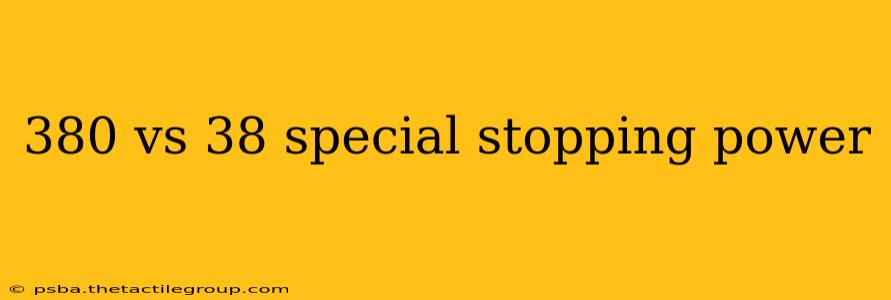The debate surrounding the .380 ACP and .38 Special cartridges often centers on stopping power. Both are popular handgun calibers, but their capabilities differ significantly, impacting their suitability for self-defense and other applications. This detailed comparison will explore the ballistic characteristics, practical considerations, and ultimately, the relative stopping power of each round.
Understanding Stopping Power: More Than Just Energy
Before diving into the specifics, it's crucial to define "stopping power." It's not simply about bullet energy (measured in foot-pounds) but a complex interplay of several factors:
- Caliber and Bullet Weight: Larger calibers generally deliver more energy, but bullet weight within a caliber also plays a significant role. Heavier bullets tend to transfer more energy to the target.
- Bullet Construction: Hollow-point bullets, designed to expand upon impact, create larger wounds and increase the likelihood of incapacitation compared to full metal jacket (FMJ) rounds.
- Shot Placement: The most crucial factor is accurate shot placement. A well-placed shot from a smaller caliber can be far more effective than multiple poorly placed shots from a larger caliber.
- Tissue Damage: Stopping power is directly related to the amount of tissue damage inflicted, affecting the target's ability to continue an attack.
.380 ACP: A Compact Contender
The .380 ACP (Automatic Colt Pistol), also known as 9mm Kurz, is a relatively small and lightweight cartridge. This makes it popular in pocket pistols and concealed carry firearms. While its energy levels are lower than the .38 Special, modern ammunition designs have improved its effectiveness.
Advantages of the .380 ACP:
- Smaller Size and Weight: Ideal for concealed carry, especially for individuals with smaller hands.
- Lower Recoil: Easier to manage for novice shooters and individuals with less upper body strength.
- Increased Availability of Hollow-Point Ammunition: Modern hollow-point .380 ACP rounds are designed for better expansion and stopping power.
Disadvantages of the .380 ACP:
- Lower Energy Levels: Compared to the .38 Special, it generally delivers less energy, potentially limiting its stopping power.
- Penetration: May not penetrate sufficiently through barriers like clothing or windshields.
.38 Special: A Time-Tested Classic
The .38 Special is a larger cartridge than the .380 ACP and has been a mainstay in law enforcement and personal defense for over a century. Its higher energy levels and heavier bullets provide more stopping power.
Advantages of the .38 Special:
- Higher Energy Levels: Generally delivers greater stopping power than the .380 ACP.
- Greater Penetration: More likely to penetrate through barriers and clothing.
- Wider Range of Ammunition Options: Offers a broader selection of bullet weights, types (FMJ, hollow-point, etc.), and loads.
Disadvantages of the .38 Special:
- Larger Size and Weight: Can be less comfortable for concealed carry, especially for smaller individuals.
- Higher Recoil: Can be more challenging to manage, especially for novice shooters or those with less upper body strength.
The Verdict: Context Matters
Ultimately, declaring a definitive "winner" in the .380 ACP vs. .38 Special stopping power debate is misleading. The best choice depends heavily on individual needs and circumstances. The .38 Special generally offers superior stopping power due to higher energy levels, but the .380 ACP's smaller size and lower recoil make it preferable for concealed carry in certain situations.
Factors to Consider:
- Concealed Carry vs. Home Defense: The .380 ACP excels in concealed carry due to its smaller size and lighter recoil. The .38 Special might be a better option for home defense where size is less of a concern.
- Shooting Experience: Novice shooters may find the .380 ACP easier to handle due to lower recoil.
- Ammunition Selection: Choosing appropriate ammunition (especially hollow-point rounds designed for expansion) is crucial for maximizing stopping power in either caliber.
- Individual Physical Capabilities: Physical strength and shooting experience should significantly influence the choice.
The most critical aspect of self-defense is proper training and accurate shot placement. Regardless of the chosen caliber, mastering firearm handling, marksmanship, and situational awareness is paramount. Consulting with a firearms expert and receiving proper training is strongly recommended before making a decision.

